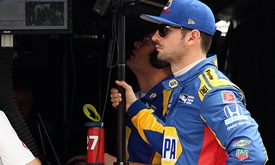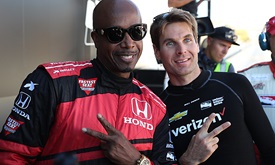Dixon finally feels comfortable in his own champion's skin
SEP 18, 2018
The first time I interviewed Scott Dixon, I could tell he wanted to be anywhere else. It was the spring of 2003 in the lobby of the INDYCAR offices. His body language told me he’d rather be across the street at Indianapolis Motor Speedway. Or playing video games. Or doing anything other than talking to a sportswriter.
The interview went well enough. Dixon had just made the move with Chip Ganassi Racing from Champ Car to the Verizon IndyCar Series, and he was clearly one of the best drivers in the business, even though he was 22 years old and had just one victory on his resume. He was a solid quote, offered thoughtful insight and made interesting points, but was shy, reserved and somewhat uncomfortable. Everything about him said he’d much rather be racing than talking about it with a stranger.
Move the clock ahead 15-plus years to last week in San Francisco. Dixon is having dinner with five journalists, and he’s fully engaged. No discomfort, no desire to be elsewhere. In fact, he’s leading the conversation. He’s asking us the questions, and they aren’t just questions about racing. He’s laughing, smiling, enjoying himself. He’s as far from 2003 as he can possibly get.
Meet the modern Scott Dixon – settled, mature, comfortable in his own skin. Yes, he’s the best of his era, perhaps the best ever. The fifth championship of his career was unwrapped Sunday at Sonoma Raceway. Only A.J. Foyt accumulated more. But there’s something else about Dixon, something beyond the accomplishments of a great racer, that’s just as extraordinary: Today’s Dixon is embracing his accomplishments and sharing them with others.
He wasn’t born to be entertaining. He grew to accept the fact that people were interested in what he did for a living. He was never loud or showy, never a braggart or the center of attention. He knew how to drive a race car; in many ways, that was the easy part. He had to learn the rest – the presentation, the periphery, the non-racing part – and he did it with the help of his wife, Emma Davies Dixon.
“He’s learned that, I think. That wasn’t Scott when he first showed up,” longtime friend Dario Franchitti said Sunday in the pits as Dixon celebrated nearby. “I credit Emma with a lot of his more open personality. He’s a pretty deep thinker. That might catch a lot of people by surprise, but he’s a really deep thinker about a lot of things. Not just racing, but stuff outside racing. He uses that intelligence to improve himself. We see the results today, and we’ll continue to see it.”
A few years after the 2003 interview, I wrote a piece for RACER magazine about Dixon’s introduction to a larger audience. A racing prodigy from an early age in his native New Zealand, Dixon was granted a special license to compete in a race Pukekohe Park Raceway at the age of 13. He recalled the entire story, at times embarrassed and at times laughing uproariously, of the barrel roll that destroyed his Nissan Sentra. He crawled out of the car, cushion duct-taped to his butt so he could see over the wheel. But the worst part for him? Tears were streaming down his face. On live TV. He loved that part of the story. He found it amusing and cringeworthy all at once.
Years later, at the height of his greatness, Dixon is in full bloom. He’s grounded yet driven. He’s intense but light-hearted. He’s the best of his time while remaining humble. He is what he is, and he doesn’t find it all that impressive, but he’s willing to share it.
“I've said it a thousand times – you've all heard me say it – he's the guy on the track (and) off the track,” team owner Chip Ganassi said. “If you take a piece of stone, inject some brains into it, chisel it out, it's Scott Dixon. He's just the man. I'm not saying anything new here. But to see him develop as the kind of person he is, his family, I don't know any other way to say it because we've all seen him since he was 21 years old or something hanging around the sport here. Just to be a part of that, to be along for the ride like that, with somebody like that, is really special.”
Franchitti raced against Dixon for 13 years. As he stood in the pits Sunday, he beamed, wise with the experience of how difficult it is to win championships. “A lot of times, I think I’m glad I’m not racing against him now,” Franchitti said with a laugh. “He was always tough to beat.”
He will be for some time, too. “He’s got time on his hands,” Franchitti continued. “As long as he wants to do it, and as long as he’s got that desire, as long as he’s got that curiosity to continue to adapt. Even this weekend, he was constantly asking questions about what he could do differently to get better. I’m not sure many people with his success would be like that.”
Not many racers are as complete – on and off the track – as Scott Dixon. It’s been a long journey, and it’s been a joy to witness.



















